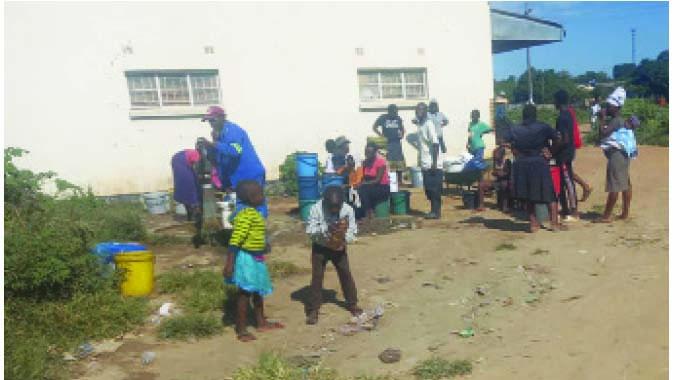News / National
Water once a week in Gweru
15 Jun 2023 at 05:48hrs |
1 Views

Most suburbs will now receive water once a week until the situation improves thereby forcing residents to rely on borehole water.
Council is supposed to pump between 60 and 80 megalitres per day to meet the city's daily water consumption but is only pumping between 30 and 40 megalitres per day.
The local authority is operating with just three pumps instead of six hence the drastically reduced pumping capacity.
Receiving water once a week has however been a perrenial problem for suburbs in high-lying areas such as Mkoba 1,3,14,15,19 and 20. Some of these suburbs at times can go for months without running water forcing residents to turn to borehole water.
In the past the city had to battle an outbtreak of cholera which was blamed on the erratic water supplies and the worst hit suburbs were those that normally get supplies once a week even when the council is operating with six pumps.
The city's water reticultion infrastructure which was put up in the 1950s was meant to serve 300 000 people but the population has now ballooned to 1,2 million people.
In the low-density suburbs, some families have drilled boreholes while council in partnership with some non- Governmental organisations has also drilled boreholes in some high density suburbs and some of the boreholes have been solar powered.
In an interview, GCC spokesperson Ms Vimbai Chingwaramusee confirmed that the local authority had introduced water rationing.
"We are rationing water because of reduced pumping capacity as we are running on three pumps instead of six. We can therefore not cover the whole city daily hence the water rationing which will result in some suburbs going for days without running water," she said.
Ms Chingwaramusee said there is urgent need to buy additional pumps as well as upgrade the city's water reticulation infrastructure.
She said the other challenge facing the city was power cuts at the city's supply dams, Gwenhoro and White Waters.
"Residents must understand that at times we experience power outages at our supply dams and that means during that time we cannot pump water. We have engaged ZETDC on the issue and we hope a permanent solution will be found," she said.
Chairman of Gweru Residents Trust (GRT) Mr Antony Madzivanyika said Gweru's long unresolved water crisis is a ticking time bomb.
"Gweru's long unresolved water crisis is a ticking time bomb and there is urgent need to address the problem before we have another cholera outbreak.
"Some residents resort to fetching water from unprotected wells when there is no water which is a health hazard," he said.
Mr Xavier Mataruse from Ascot suburb said they now depend on borehole water because most of them have no running water.
"This announced water rationing is not new because we are used to this situation of going for days without water," he said.
Council is supposed to pump between 60 and 80 megalitres per day to meet the city's daily water consumption but is only pumping between 30 and 40 megalitres per day.
The local authority is operating with just three pumps instead of six hence the drastically reduced pumping capacity.
Receiving water once a week has however been a perrenial problem for suburbs in high-lying areas such as Mkoba 1,3,14,15,19 and 20. Some of these suburbs at times can go for months without running water forcing residents to turn to borehole water.
In the past the city had to battle an outbtreak of cholera which was blamed on the erratic water supplies and the worst hit suburbs were those that normally get supplies once a week even when the council is operating with six pumps.
The city's water reticultion infrastructure which was put up in the 1950s was meant to serve 300 000 people but the population has now ballooned to 1,2 million people.
In the low-density suburbs, some families have drilled boreholes while council in partnership with some non- Governmental organisations has also drilled boreholes in some high density suburbs and some of the boreholes have been solar powered.
In an interview, GCC spokesperson Ms Vimbai Chingwaramusee confirmed that the local authority had introduced water rationing.
"We are rationing water because of reduced pumping capacity as we are running on three pumps instead of six. We can therefore not cover the whole city daily hence the water rationing which will result in some suburbs going for days without running water," she said.
Ms Chingwaramusee said there is urgent need to buy additional pumps as well as upgrade the city's water reticulation infrastructure.
She said the other challenge facing the city was power cuts at the city's supply dams, Gwenhoro and White Waters.
"Residents must understand that at times we experience power outages at our supply dams and that means during that time we cannot pump water. We have engaged ZETDC on the issue and we hope a permanent solution will be found," she said.
Chairman of Gweru Residents Trust (GRT) Mr Antony Madzivanyika said Gweru's long unresolved water crisis is a ticking time bomb.
"Gweru's long unresolved water crisis is a ticking time bomb and there is urgent need to address the problem before we have another cholera outbreak.
"Some residents resort to fetching water from unprotected wells when there is no water which is a health hazard," he said.
Mr Xavier Mataruse from Ascot suburb said they now depend on borehole water because most of them have no running water.
"This announced water rationing is not new because we are used to this situation of going for days without water," he said.
Source - The Chronicle
Join the discussion
Loading comments…

























